People Can Be Vegan, But The Father Of "Reducetarianism" Doesn't Agree
Brian Kateman wants a vegan world, yet he tells people it's impossible to be vegan.
According to Brian Kateman, founder of the Reducetarian Foundation, I’m a reducetarian and if you are reading this maybe you are too. Vegans, vegetarians, and anyone who makes an effort to eat less animal “products” than they used to eat is a so-called reducetarian. Brian believes that people can save animal lives by eating less animals, essentially banking on a fantasy supply and demand version of how our rigged, overabundant, corporation-dominated, artificially inflated, and waste-heavy food system actually works. He also believes that factory farming can be eradicated if people just reduce their amount of animal consumption, as if more humans eating less animals won’t still require cramming billions of individuals together to meet society’s reducetarian demands.
Despite professing in numerous interviews that he would like to see a “vegan world” eventually, the Reducetarian Foundation’s vision is “a world in which societal consumption of red meat, poultry, seafood, eggs, and dairy is significantly reduced.” What constitutes significant reduction I do not know. In a recent interview he did with Sentient Media Brian Kateman said, “To me, particularly vegan, from my perspective, is an impossible standard to reach according to its own definition,” yet in the above tweet he calls for people to do the best they can to avoid being complicit in animal cruelty, which is precisely what veganism is about (if individuals are being honest about the term “best”).
Societal pressure leads people to abandon being the best versions of themselves
Kateman coined the reducetarian label in 2014 after he tried being a vegetarian but gave into eating part of a cooked turkey corpse during a Thanksgiving dinner with his family. Indeed, my last Thanksgiving meal was almost a decade ago and I had the highly unpleasant experience of witnessing two self-proclaimed vegetarians eating sliced up dead turkeys. I only made the special exception (not a fan of holidays) to join this meal in the first place because I was promised multiple times that it would be strictly plant-based, which was a longtime personal standard I’ve had when eating with others. I’ve since come to learn that it’s not uncommon for people who call themselves vegetarians to eat animal flesh either regularly or occasionally. If you don’t believe me just ask the next few vegetarians you meet if they ever eat any birds, fishes, or any other type of animal flesh.
From Why and How Brian Kateman Launched the Reducetarian Movement:
…it wasn’t until much later that I learned about the many negative impacts of meat consumption on our planet. I then quickly decided to become a card-carrying vegetarian. It was pretty awesome – in addition to aligning my values with my food choices, I felt healthier, had more energy, and was enjoying eating plant-based meals. The only problem was that I occasionally found myself “falling off the bandwagon”, eating small amounts of meat in particular social situations. I remember one Thanksgiving as my father passed me a drumstick my sister remarking in jest, “I thought you were a vegetarian?” I explained to her and the rest of the table that perfection and purity isn’t the goal, that meat consumption isn’t an all-or nothing premise and that every plant-based meal is one worth celebrating because it is healthier, more eco-friendly, and kinder to animals...
I decided then that I wanted to reframe the conversation away from “cheating vegans” and “lazy vegetarians” and toward positive language around meat reduction.
I agree with Brian that we should have positive language around our dietary and lifestyle choices, specifically words that connote something meaningful and accurately describe our mindset and behavior. Eating less animals, depending on how that’s done, can bring profound personal benefits with overall better health outcomes such as more energy, less sickness and disease, and slower aging- but that’s more about being compassionate to oneself, rather than being compassionate about the wider world around us.
In Brian Kateman’s 2014 TEDx speech, which is how I initially found out about reducetarianism, he asks “But what is a person who eats less meat? You could say I'm a semi-vegetarian, I'm a mostly-vegetarian, I'm a flexitarian.” He goes on to say that you could simply describe yourself as a “reducetarian.”
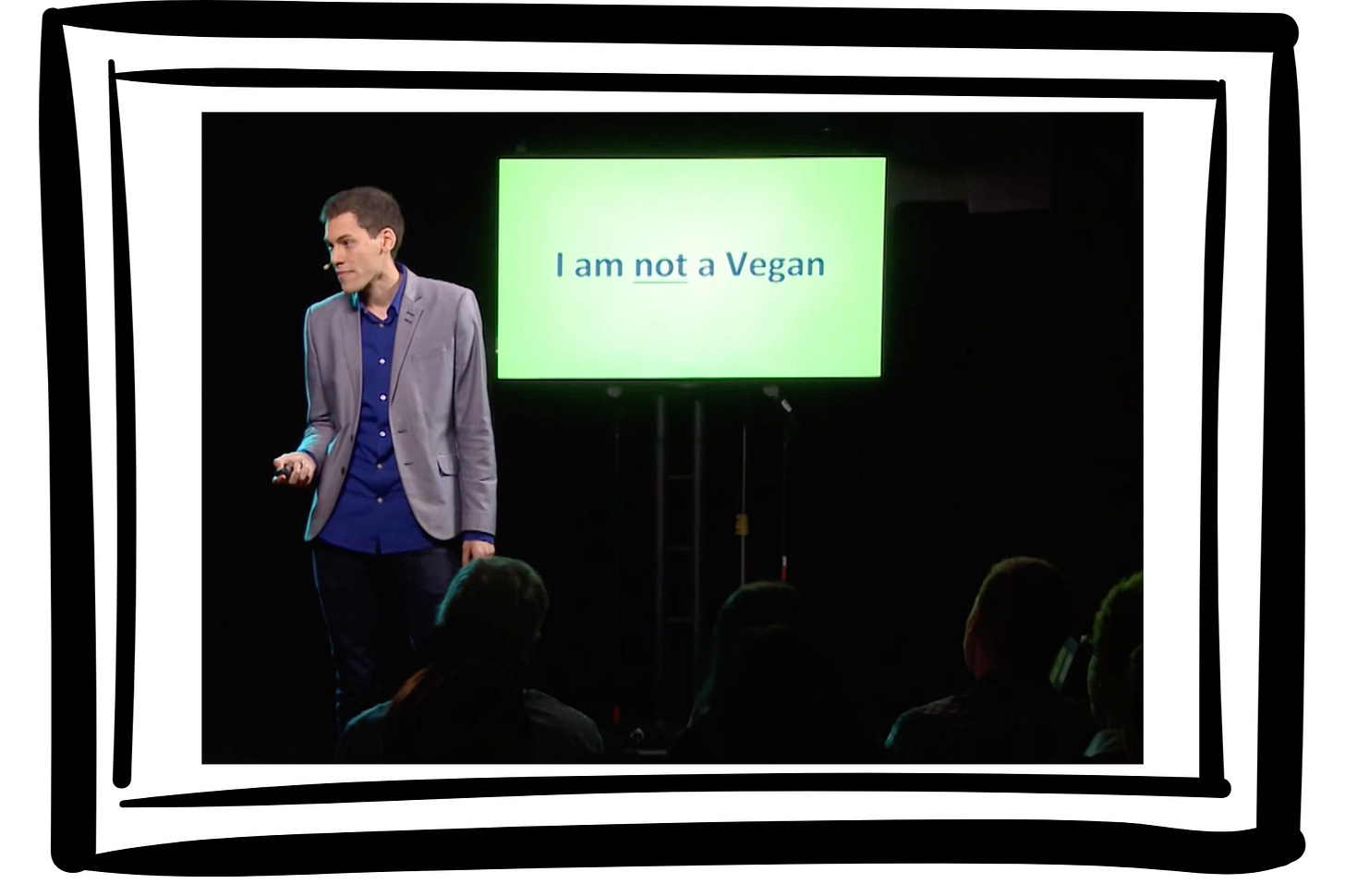
I don’t see why we need any of this less-animal-consumption language when an individual is really just doing what they’ve always done, albeit just at a lower level. These benign sounding labels overpower the cruel reality of supporting the systematic physiological and psychological destruction of innocent individuals for taste, convenience, tradition, social acceptance, and profit. Are any of these labels necessary? I don’t see why we need a word to describe someone who eats “less” animals when we can acknowledge that eating animals is entirely unnecessary to begin with. Plus people often exaggerate how little animals they eat, such as myself back in the day when I used to identify as a “meat minimalist.” I still ate the flesh of animals nearly every single day, despite the fact that every serving of flesh I ate wasn’t one bit necessary for my health, survival, or happiness. I claimed an identity that made me feel better about my food choices, so I could keep engaging in behavior that brought me much personal satisfaction despite the fact that it was deeply immoral.
Nothing wrong with veganism as a philosophical and ethical stance
The word “vegan” is what I’ve identified as for almost 12 years (about one-third of my life). I don’t think being vegan makes me special, perfect, or pure in any regard, but I use the term because it distinguishes me and it accurately describes my consistent attitude and behavior towards nonhuman animals. I don’t claim that me being vegan in itself has ever saved a single animal. Vegan may not be the prettiest-sounding word and it doesn’t necessarily have delightful connotations for many people, but when you explore the definition it’s hard to say it’s not a beautiful word, yet it’s unfortunate that it even needs to be a word in the first place.
In his latest article published in the Daily Beast, Veganism Is Impossible, Because People Aren’t Perfect, I was thrilled that Brian shared the original definition of veganism, which I believe contradicts his headline that veganism is unattainable.
"Veganism is a philosophy and way of living which seeks to exclude—as far as is possible and practicable—all forms of exploitation of, and cruelty to, animals for food, clothing or any other purpose; and by extension, promotes the development and use of animal-free alternatives for the benefit of animals, humans and the environment. In dietary terms it denotes the practice of dispensing with all products derived wholly or partly from animals."
What is critical to grasping the meaning of veganism as a whole is “possible and practicable.” Notice that the definition doesn’t state that exclusion to the exploitation and cruelty to animals can be done perfectly. People often try to pull gotcha cards on vegans by pointing out things that we may do that can very well cause harm to animals (e.g. how the food we buy is grown, how the vehicles we drive cause pollution, or how what some vegans feed to their companion animals is derived from murder), falsely implying that veganism is about perfection, which we have to keep reminding people over and over again that it’s not.
From Brian’s interview on the podcast Our Hen House:
“I don't identify as a vegan. I want more vegans and I want a vegan world, so let's get that straight. I don't identify as a vegan because for me personally it connotes perfection and it makes me feel uncomfortable because I know I'm never going to live a perfect life."
It’s fine to not identify as vegan if that’s not something you want to do, but why say the word connotes perfection when the definition clearly states that it’s not about that and the one thing perhaps all vegans can agree on is that veganism isn’t about perfection? Promoting the idea that veganism is about perfection is just going to push more people away from wanting or trying to be vegan. A term that jumps out to me at connoting perfection that I’ve heard many vegans misuse is “cruelty-free.” Although the production of a lot of vegan-friendly foods don’t cause intentional cruelty to animals like what is required for the production of flesh, dairy, eggs, and honey - vegan food can still be tied to cruelty that does indeed harm (and sometimes kill) such as deforestation, pesticides, pollution, water mismanagement, plastic packaging, and human trafficking. I’ve often described veganism to people as trying to suck less, not trying to not suck all the way.
I agree with Brian’s assessment in his recent article that vegans are a teeny tiny minority and that vegetarians are quite a small minority as well. He cites a Gallup poll from 2018 that published data which said 3% of Americans were vegan and 5% were vegetarian, both of which had negligible improvement since the last Gallup polling from 2012 where they gathered that 2% of Americans were vegan and 5% were vegetarians. He also cited a 2014 Faunalytics study that concluded 84% of people who tried a plant-based diet eventually went back to dining on animals. Clearly most people are not willing to abstain from animal farming and those who are usually get off the ride fairly early.
Vegan and plant-based-diet recidivism is a very real and frequent phenomenon and is something I’ve witnessed a lot in my personal life. Back in the day I used to frequently host [mostly] coworkers at my apartment for the day and teach them about why I was vegan and why others should be too. I’d make them multiple comforting vegan meals and with consent, show them a variety of hard-hitting animal-rights-promoting and nutrition videos that included speeches, undercover investigations, and documentaries. The vast majority of people who came over to allow me to educate them left with the intention to be vegan. However, I worked with all of these people at a grocery store and could see what they’d buy and consume, so if they went back or never tried being vegan in the first place I’d find out one way or another.
Two people who had become some of my closest and most cherished friends after these vegucations and who I could have sworn would have been vegan for life didn’t even last close to a year. One of them went back to eating animals full on as soon as a guy she had yearned to be romantically involved with moved to her same city (I think this was to increase her chances of being desired by him) and the other friend went back after he had formed a new intimate partnership with someone he met. The main pattern I saw for why people go back to eating animals or not being vegan in general is because of social reasons. I’ve also seen a lot of people go back after they didn’t feel well on a vegan diet, which is usually attributed to not consuming enough calories or eating far too much junk food.
Are you still a true vegan if you go on walks outside?
Brian and I had a Twitter dialogue and one of his straw-reaching arguments about why I couldn’t truly be a vegan is because I go on walks and go for drives that are not absolutely essential, ultimately resulting in more insect deaths. Is it possible for me to not go on walks or drives other than when 100% necessary? Sure. Is it practicable? Absolutely not. Do I kill insects every time I place one foot in front of another in a continual forward motion or every single time I take a drive? No, I do not think so, yet he wanted me to “take accountability.” Maybe I could just become an advocate for walking indoors on treadmills since that would spare so many insect lives. Brian concluded that my negative impact on other animal life when I walk and drive might be worse than humanity’s impacts on animals who are artificially bred into existence for obligatory abuse and killing.
Speaking recently with Sentient Media Brian says:
I still think on average telling people to cut back on animal products is a more persuasive message than telling them to go vegan because the vast majority of people do not want to go vegan, but it's also the vast majority of people don't want to eat less meat.
If we want a world with more fairness, justice, equality, and sustainability then we shouldn’t compromise on messaging. I’ve reviewed the work of many organizations that focus on modern day human slavery and sexual assault, but I don’t see any examples of them persuading people to cut back on how much rape they inflict or how many people they force into slavery. One of my favorite types of videos to watch is child sexual predator catcher videos like Dads Against Predators. When these predator catchers confront and expose child abusers they don’t plead with them to cut down on how many kids they sexually violate and traumatize, they make it clear that it’s just plain wrong and shouldn’t happen to any children period. We don’t ask domestic violence abusers to do Take-It-Easy Tuesdays where they chill out on the alcohol and the beatings each Tuesday and give their battered wife a break for a day. So why make advocating for cutting back on animal consumption a priority when we are aware that eating any amount of animals isn’t necessary, causes immense suffering, and is unsustainable for a species of 8 billion?
I’m a big proponent of suffering reduction and Brian Kateman ostensibly is too. We both believe in deploying a wide range of tactics to ultimately lead to a better world for humans and other animas alike. However, I don’t believe that it’s okay to condone needless violence to other animals in any magnitude, which just perpetuates this idea that animals can be tools, resources, playthings, and ingredients for humans to use and benefit off of. Of course the less animals suffering under human hands in the world the better (no matter how that’s achieved), but I don’t think advocating reducetarianism or vegan bashing is one of the most optimal ways forward. Advocating for veganism doesn’t often result in people becoming vegan, but it can lead to people making significant reductions in their animal consumption, which is what Brian ultimately advocates for.
Factory farming sucks, but not animal farming as a whole?
Throughout Brian’s work he promotes this idea that factory farming is awful and something not to support or cut back on as much as you can, but that much better alternatives of farming animals exist. He believes ingesting the body parts of victims from non-factory farms should even be celebrated…
From Brian’s interview with Our Hen House:
I think vegans spend too much time worrying about these small local farmers. I think anything that's not factory farming is something that either should be celebrated or left alone, aside from the fact that we need to remind people that most animal products [factory farming] are not produced in a less cruel or more sustainable way.
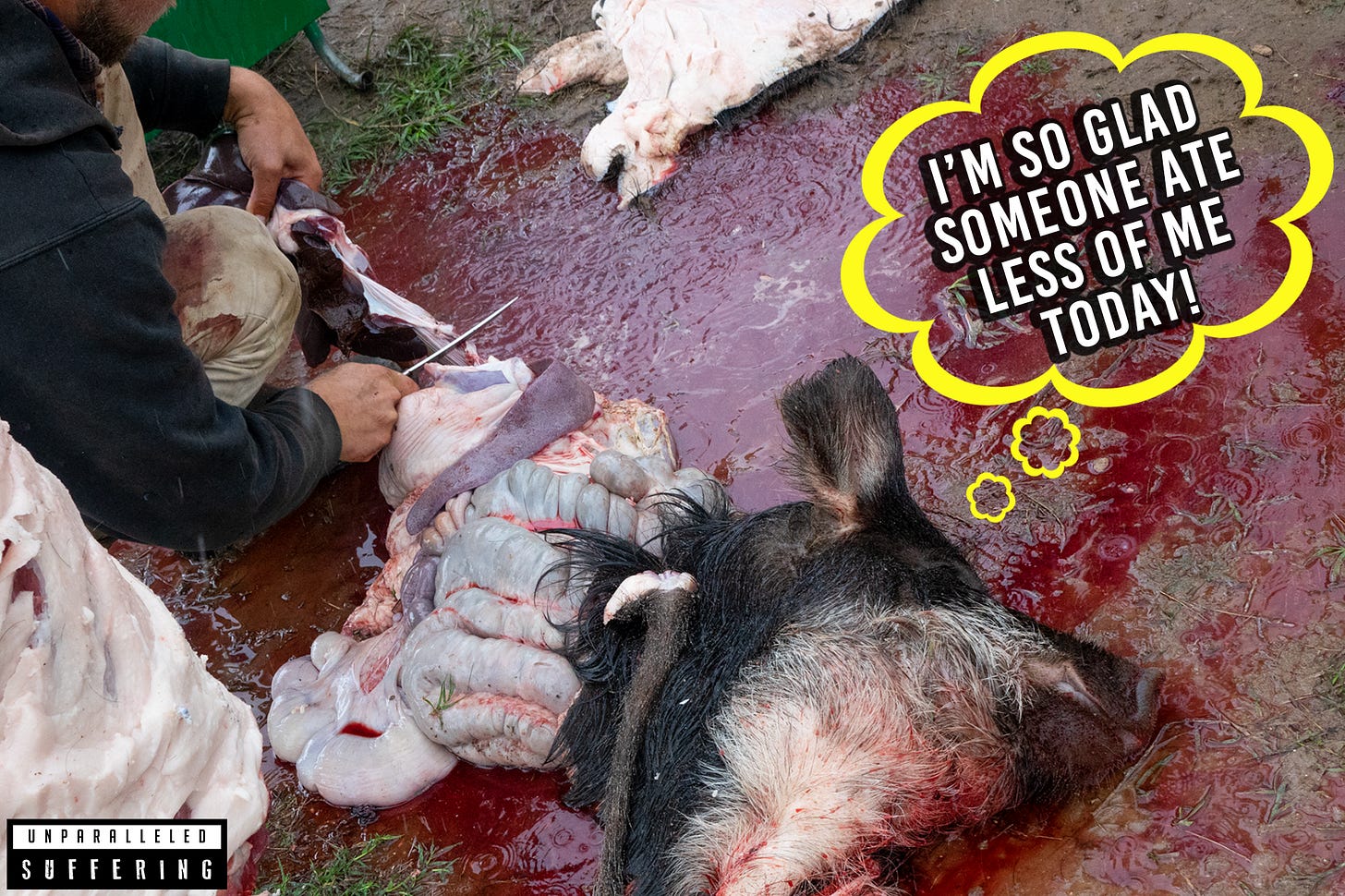
Meat Me Halfway is the feature length documentary from Brian Kateman. In the film he finds out through Daisy Freund, Director of Animal Welfare at the ASPCA, that White Oak Pastures in Bluffton, Georgia has three of the top animal welfare certifications (Global Animal Partnership Step 5, Certified Humane, and Animal Welfare Approved). The flesh of White Oak Pastures animals sold at Whole Foods Market are categorized as Step 5, which is their highest animal welfare certification and entails that there have been no ‘physical alterations’ to the animals (the overwhelming vast majority of Whole Foods locations don’t carry any Step 5 body parts).
Will Harris, the owner of White Oak Pastures, welcomes Brian out to his large “humane” farm. Replying to Brian’s question about if he thinks the animals are happy and live a net positive life Will responds “well they're able to express instinctive behaviors.” Does giving individuals the bare minimum opportunity to express instinctive behaviors constitute humane treatment? The US has the highest incarceration rate, but the majority of prisoners, truly guilty of a crime or not, can still express instinctive behaviors such as eating, drinking, and socializing. Would we say most prisoners are therefore treated humanely?
After Will makes it clear that he doesn’t know any of the animals he uses for food as individuals with their own personality he goes on to boast about how none of the 2,000 or so pigs he has are castrated or have any other common mutilations for the pig industry such as teeth and tail mutilations. Will Harris on castration:
We used to castrate every animal on this farm that wasn't named Harris, now we don't cut anything.
On the topic of the animals at his farm getting killed at the White Oak Pastures farm slaughterhouse, Will says “When I go, I would like it like that.” He offers to take Brian and the camera operator into the on-farm slaughterhouse and says that they can film anything they want except for the actual slaughter, stating that it isn’t respectful to the animals to record the slaughter. Will Harris on not getting footage of the reality of animal slaughter on his farm:
That's the only area where there's not full transparency and there's transparency there, it's just not, you know, it doesn't seem right."
Will compares filming an animal being slaughtered to himself being filmed while defecating.
You know I don't want you to film me while I'm defecating. It's just everybody deserves a little bit of dignity and respect.
What right would anyone have to film Will taking a shit and why would anyone need to know what Will taking a shit looks like? However, when it comes to things we are putting into our body and that we also have a choice to support or not, we should be able to have full transparency for what the creation of these products entails and what these products contain. If transparency about things we are encouraged to put into our body doesn’t exist then is it really a good idea to allow these things into our body?

While Brian was watching animals being killed and dismembered he asked Will if he wishes “that all Americans had the opportunity to see this so that they understood what was involved?”
You know, despite the fact that I just said that it takes an unhealthy person to enjoy watching slaughter, I think everybody ought to see it. And I'm very proud of what we do here.
Will Harris was so proud of his animal killing operation and supportive of everybody being able to see it that he didn’t allow Brian’s camera operator to capture the reality of the killing process.

One last important thing I’d like to touch on is an example Brian gives in his recently Daily Beast article about why people can’t truly be vegan:
Since many people go vegan out of their love for animals, it’s not uncommon for them to have pets. But caring for one animal often means harming others. Forget about rescuing a cat. As obligate carnivores, you’ll need to buy them meat-based food.
Having cats actually does not necessarily require that their guardian feeds them dead animals. I don’t want to go too deep into this in this article (I’ll save it for a future one), but most cats can thrive and get the tastes they like and nutrition they need on a properly formulated plant-based diet. I highly recommend checking out the work of Andrew Knight, a specialist in veterinary work and a professor of animal welfare and ethics. His presentations and recent studies he’s published to this page dispel the myths that cats and dogs have to be fed animals to be healthy and thrive. I know this is purely anecdotal, but I’ve lived with 3 different partners who have plant-based cats and 2 past roommates who had plant-based cats and all these cats have been healthy through an observational standpoint as well as through examinations at vet appointments. And as far as dogs go, my nonvegan parents feed their dog a completely plant-based diet and their dog will likely live a longer and healthier life than most dogs who are fed the Standard American Dog Diet. Suffice it to say, we have vegan alternatives for just about everything and the alternatives aren’t usually inferior.
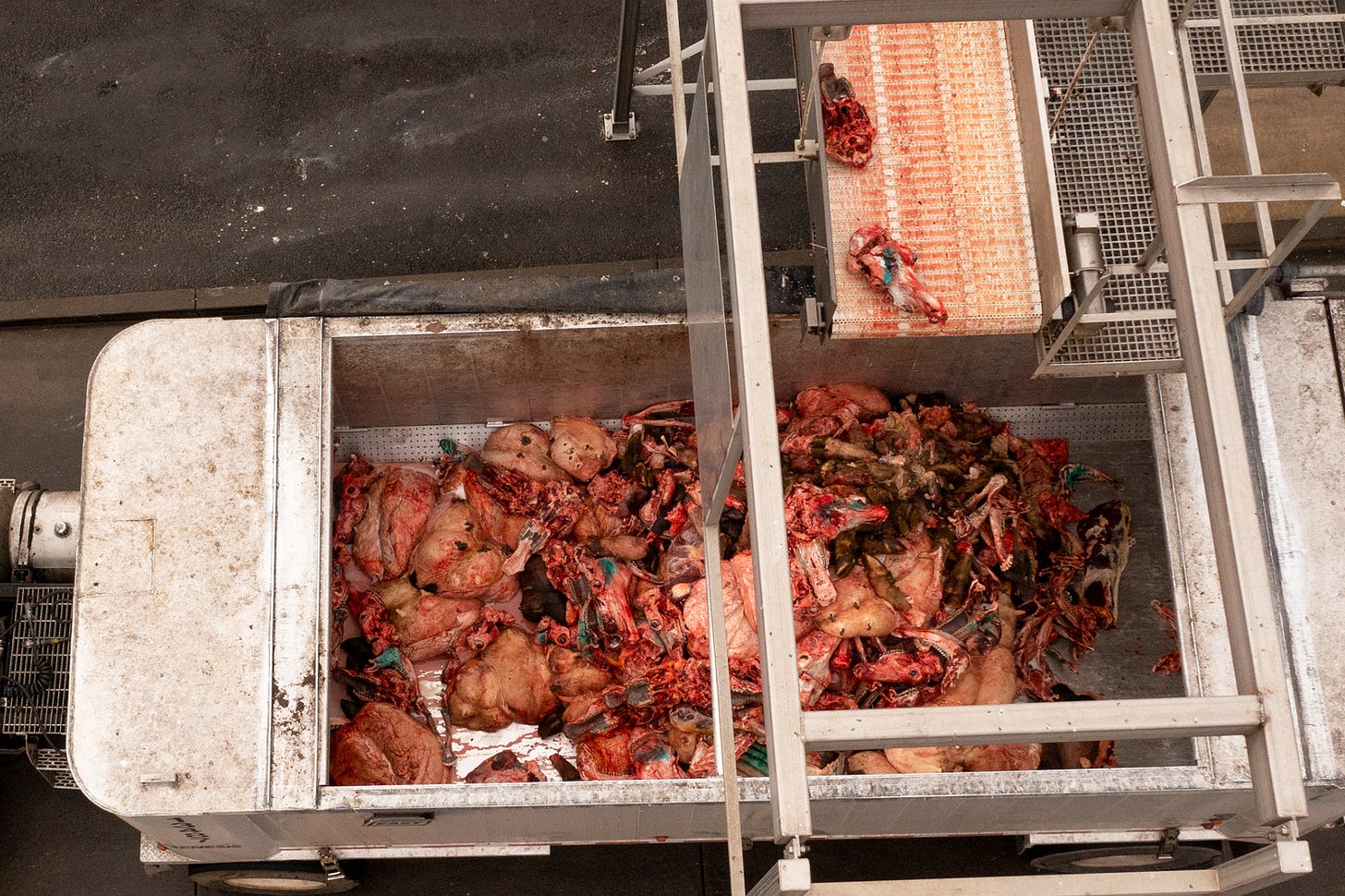

The rate of animal consumption around the world continues to climb higher and higher, a fact that Brian Kateman has recently acknowledged in his interview with Sentient Media. We aren’t going to see any major changes with this reality by focusing mostly on individual change. Despite any information they learn, most humans will continue to eat animals because they believe it’s natural, necessary, normal, and nice (tasty). The two ways I see things changing the most are by food policy changes through lobbying that push for a healthier and more sustainable food system where farmers are supported and incentivized to transition to plant-based veganic farming, plant-based nutrition is prioritized, and through subsidizing healthy plant-based options like fruits and vegetables and making them more accessible and affordable for consumers nationwide. Agriculture Fairness Alliance is doing fantastic work in this field and I’m happy to say I’ve been a monthly supporter of what they do for a few years now.
Other than that I think that given the chance for reduced costs and more efficiency and less labor, maybe cell cultured flesh will one day takeover the biological animal counterpart, but I have absolutely no idea what’s going to happen. Either way, it’s not realistic that we are ever going to reach the masses in meaningful ways by advocating for veganism or reducetarianism. I think systemic changes are where we can accomplish the most gains for a better world for humans and all other life. With that being said, I still don’t think we should compromise on the message that animal lives and bodies are their right and don’t belong to us no matter what kind of system they are being oppressed under.
So what do you think about reducetarianism and saying that veganism is impossible?







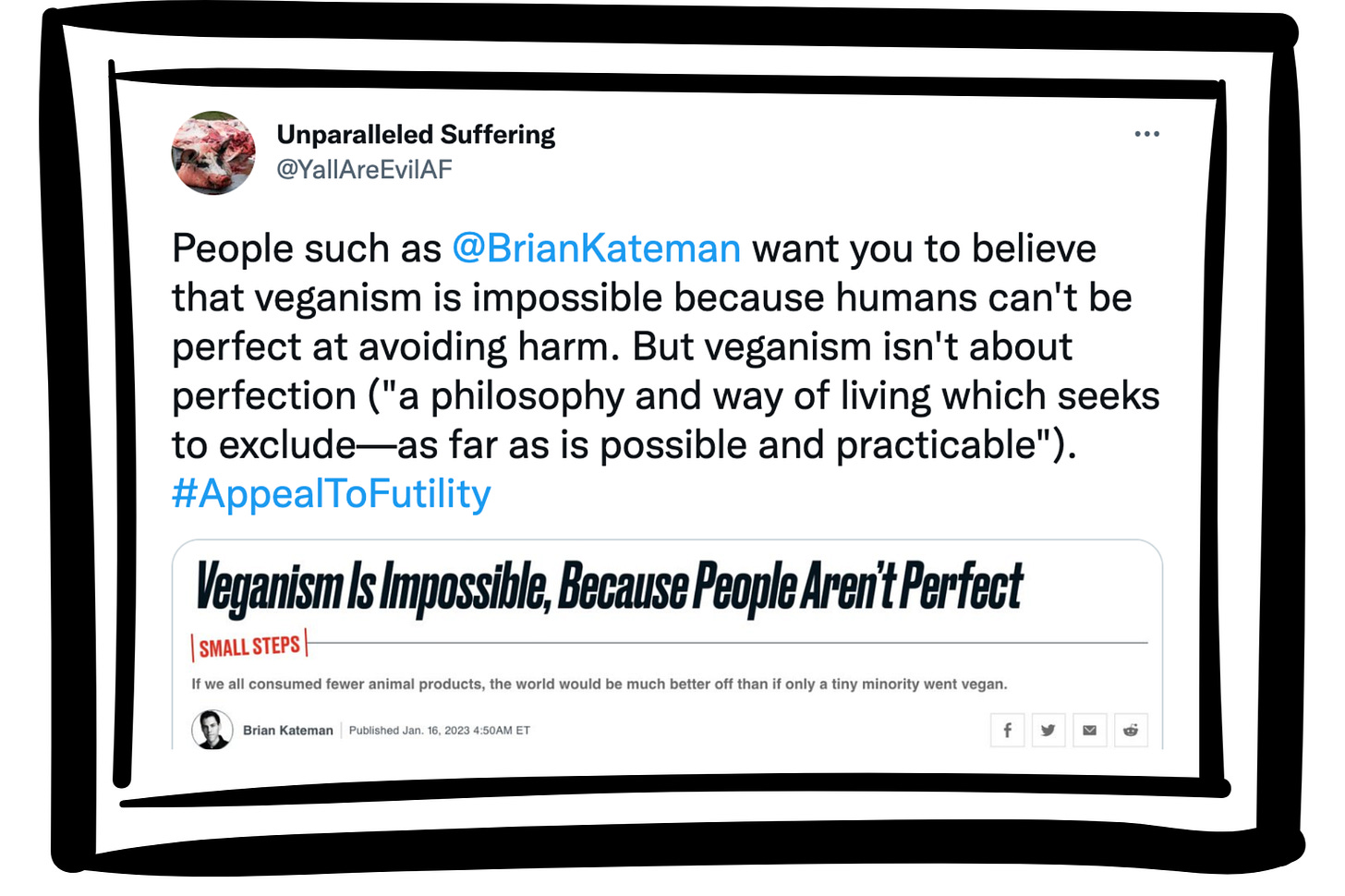

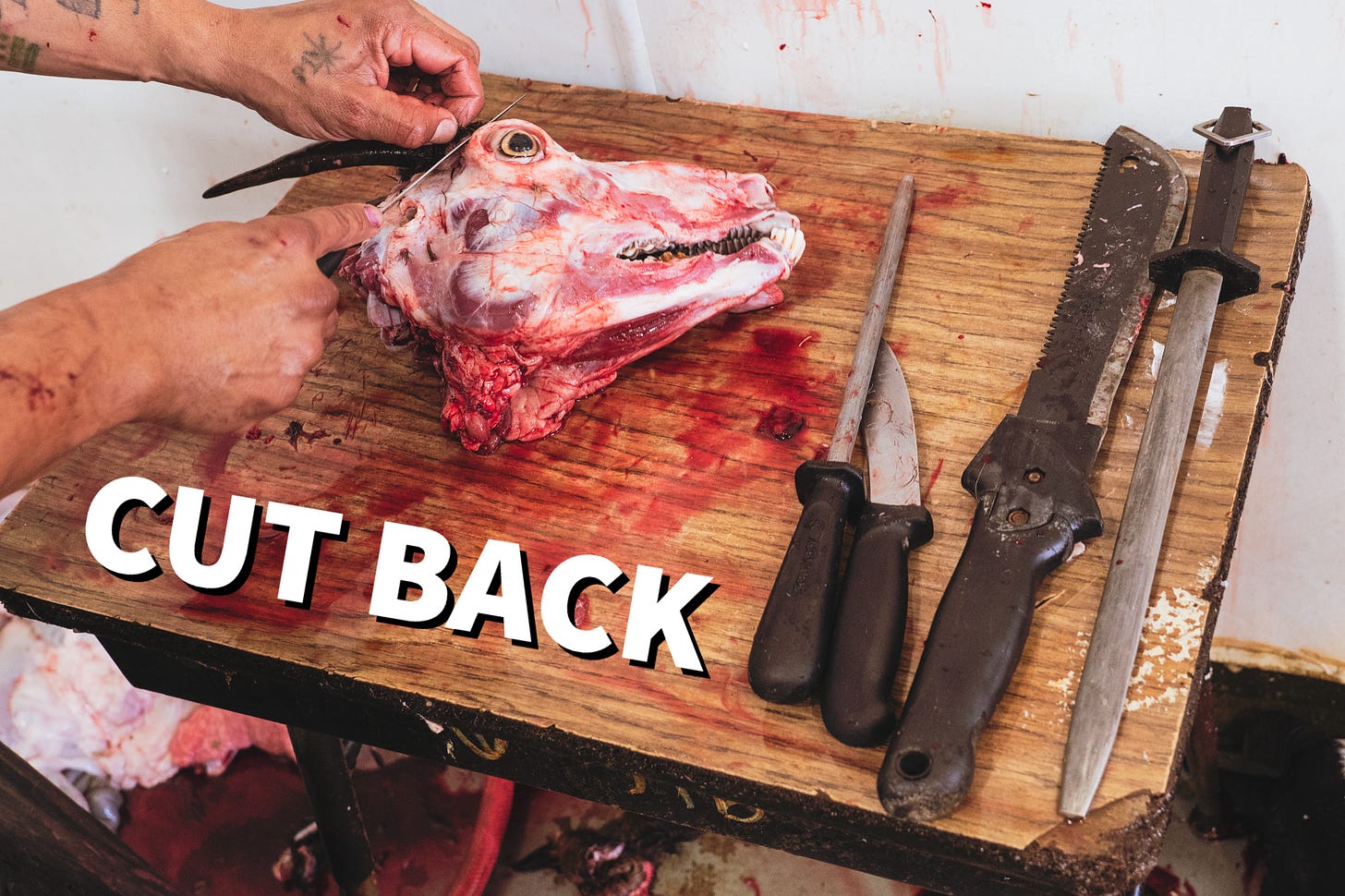



Brian is a grifter who makes money off the suffering and death of non-human animals so of course veganism is a threat to his business model of telling people what they wish to hear-i.e. you can love animals and be kind to them even if you pay to have them tortured & killed. his fallacous logic shows why considering veganism as a dietary choice instead of a moral imperative is so problematic.
i can't help but wonder if he takes the same position about other forms of violence such as "hitting my wife is bad so i cut back to doing it only every other day". of course, doing less harm is always preferable to doing more harm but that never justifies choosing to do harm in the first place.
in addition, Kateman also presents a false dichotomy by suggesting that veganism is invalid because it is impossible to be 100% vegan. in other words he claims that eliminating the 95% of the harm which we have control over is not good enough due to the other 5% that we have no control over. it's like claiming that since some people will certainly die due to auto accidents it's OK to intentionally run over pedestrians. what is certain is that if he were a helpless victim himself instead of a willing perpetrator of violence & exploitation, what is right and what is wrong would suddenly become crystal clear.
There are animal "advocates" who do not empathize very much or at all with actual chickens, cows and other nonhuman individuals and species. Their focus is abstract: "reduce suffering," "end factory farming," "support better conditions," etc. A person who can watch a chicken, pig, turkey or cow being slaughtered, and then claim or suggest that it is morally worse to take a walk or drive a car because more insects are likely to be killed that way, is emotionally detached. Brian Kateman is an example. So are Michael Pollan and Peter Singer. Pollan has freely acknowledged he does not feel for, or with, cows, pigs or chickens. Singer claims he is vegan when alone but "free-range" in social situations. In an article a couple years ago he and the journalist interviewing him discussed how much easier it is to get real "free-range" eggs in Australia than in the U.S.
Activist-strategist Patty Mark in Australia, founder of the Open Rescue concept in the early 1990s, said this was nonsense. Things are the same for farmed animals in all countries. Desire for convenience and conformity added to a deficit of empathy with (other) animals work together against ending the needless harm we inflict. If slaughter-free meat could permanently reduce (best of all eliminate) the number of animals born to be nothing but human "mouthpieces," we would be remiss not to support it.
Karen Davis, PhD, President, United Poultry Concerns. www.upc-online.org